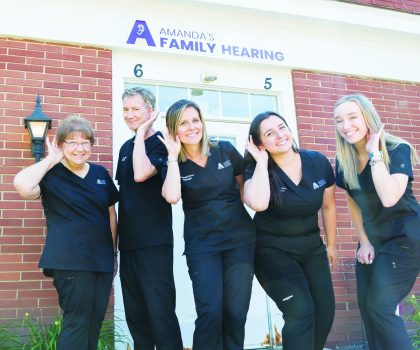For people with severe to profound hearing loss, a cochlear implant can be life-changing

By Patricia Nugent
Amanda’s Family Hearing was founded with the mission of helping others by improving their quality of life through better hearing.
It’s not surprising that Founder Dr. Amanda Barbur recently decided to undergo additional training on cochlear implants so she could help those with severe to profound hearing loss who might not be gaining enough benefit from amplification. “I just didn’t want to stop with hearing aids. I wanted to offer more options to these patients,” Amanda says.
What are the Causes?
There are several causes of hearing loss in adults, which affects 6.6 million Americans over the age of 12. One of the most common is age-related hearing loss (presbycusis), which is usually the result of damaged hair cells in the inner ear that translate sound vibrations into electrical signals for the brain. Exposure to loud sounds, medications, head trauma or certain viral and bacterial infections can also damage the hair cells. Hearing loss can also be genetic.
Sending the Signals Again
A cochlear implant allows sound to bypass the damaged part of the ear and stimulate the auditory nerve properly. The signal is then sent to the brain for processing. This, in essence, is what allows you to hear.
“As a member of the Cochlear Provider Network, we work closely with the otologist who surgically implants the cochlear device,” Amanda says. “If our testing shows that someone is a cochlear implant candidate, we will then refer them for a medical examination. To give the patient time to heal, they will come back to our office about a month after the device is implanted to have their device activated and programmed.”
The quality of hearing that cochlear implants provide has improved significantly over the years, with a recent study reporting that 95% of patients say they were satisfied to very satisfied.
At first activation, patients sometimes say the sound quality is unnatural or a little robotic or tinny, but that it greatly improves over the first few months, with the most improvement typically occurring in the first 3-6 months. Patients are encouraged to wear their cochlear implants for at least ten hours a day, but the more they wear it, the better their outcome will be. If their eyes are open, their ears should be on.
The cochlear devices are covered by most insurances and can last 20 years to a lifetime.
High-Tech Testing
Testing for cochlear implant candidacy is different than a standard hearing test. “Unlike a regular hearing exam, we test a patient with their hearing aids on, and only after verifying that the aids are functioning optimally for their loss,” Amanda says. “If a person’s word understanding is at or below 60% with their hearing aids, they can be a cochlear implant candidate. Due to significant advances in technology, the criteria has changed over time and more patients can benefit from cochlear implants than ever before.”
Keeping up with a Growing Patient Load
After working at what was originally MaryAnn’s Family Hearing, Amanda purchased the practice when MaryAnn retired in 2020 and renamed it Amanda’s Family Hearing.
Amanda says running her own private practice is important to her so she can help her patients in the way she thinks is best, and can spend as much time with each patient as she feels is necessary.
Joining Dr. Amanda Barbur are audiologists Dr. Kevin Burkitt and her newest hire, Dr. Julia Saxon. Dr. Saxon, who hails from Lake County and just received her doctorate in Audiology, shares a strong passion for hearing aids and cochlear implants, both of which she has extensive training and experience with throughout her graduate studies.
“Dr. Saxon has been an invaluable addition to the practice and we are excited to have her with us,” Amanda says.
Amanda and her staff are involved in the community and enjoy participating in public events and health fairs throughout Lake County.
“Since the beginning, our mission has remained to serve this community,” she says. “Come hear with us.”
Amanda’s Family Hearing is located at 1701 Mentor Avenue, Suite 5, in Painesville. Call 440-357-4327 or visit AmandasFamilyHearing.com for more information.
